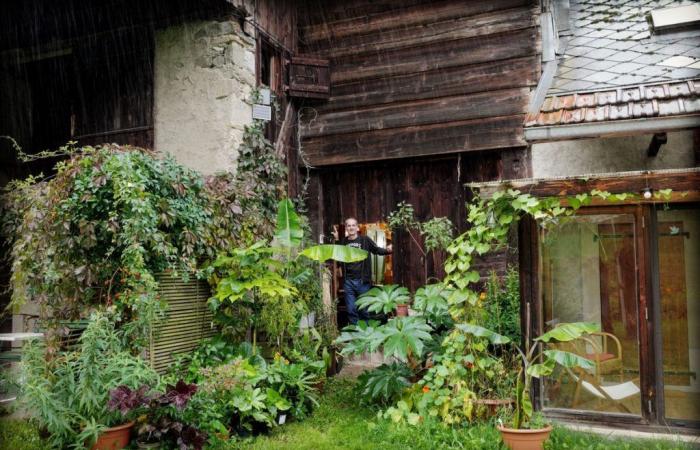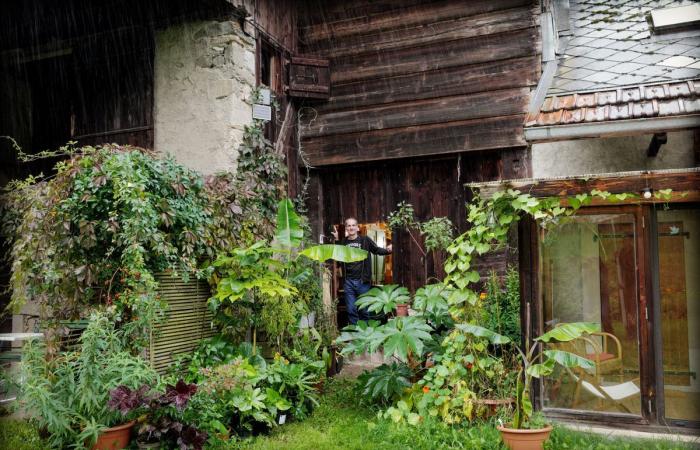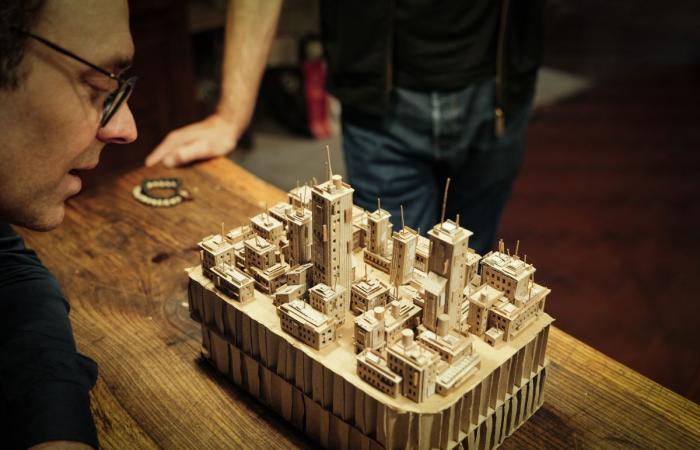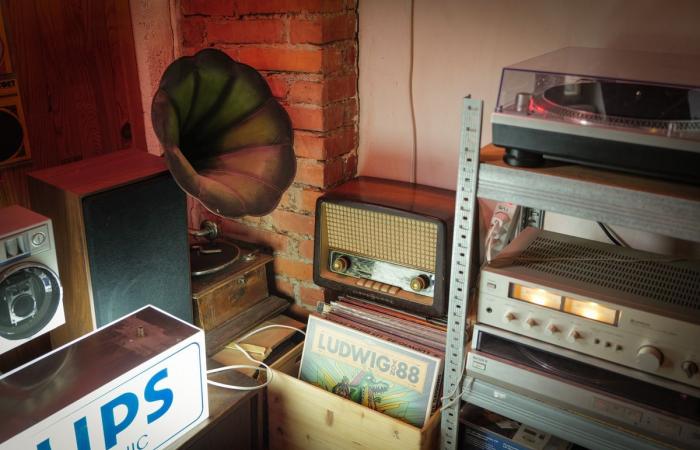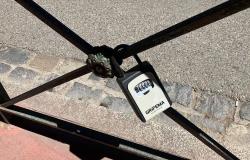– Matthieu Grillet, concierge of the most beautiful studio on the planet
Visual artist, manufacturer of cardboard cities, this horticulturist specializing in palm trees manages the family farm behind Salève, where all the groups from Geneva go to record. Visit.
Published today at 6:35 p.m.
Behind the Salève, September 26. Mathieu Grillet, manufacturer of cardboard cities, horticulturist and manager of Chez Gatillon, a farm-studio where many Geneva groups record.
LAURENT GUIRAUD
Subscribe now and enjoy the audio playback feature.
BotTalk
- Matthieu Grillet makes cities from recycled cardboard.
- He is a horticulturist and manages a studio farm behind Salève.
- The studio records many groups from Geneva and elsewhere in Switzerland.
- Matthieu Grillet will exhibit at the WRP Foundation in December.
It is a farm behind the Salève, on the slopes of a valley covered with forests and fields. You get there by a path twisted against an edge. You enter through a large wooden door. On the stone wall, the date of construction is authentic: 1867. At a place called Chez Gatillon, the massive building has been in existence for 150 years.
Matthieu Grillet makes the visit. Him, the janitor as he likes to call himself – “I also do the laundry”. Also a horticulturist, his profession, and maker of cardboard cities, his artistic side. Under the immense roof, there are eight spacious bedrooms and a huge attic. In the kitchen lounge on the ground floor, the cows’ manger serves as bins for the records recorded here for thirty years. Crowd of records. Where is the studio itself? In the music room, which is also suitable for table tennis. Like anywhere else musicians want. In the kitchen for example. And even in the toilet – this has already been done, to obtain a particular sound.
Past cool baba
The farm has been in the Grillet family for almost fifty years. Purchased in the 1970s by a group of friends in a great community spirit. There were architects, activists, ecologists, feminists there. How many people found themselves up there remaking the world! How many conversations Matthieu, as a child, listened to with an attentive ear, seduced by these debates between adults. “My values, my desires, were born there.”
Later, the tenants set up an association to manage the premises, a “simple, pragmatic, spontaneous organization” structure. “When a recording project needs to be done, we do it. Musicians don’t wait two years for space to become available.” This fall again, the metal group Rorcal made a visit, waiting for singer Milla Pluton. During our visit, we found half of the Geneva pop quartet Barrio Colette: Anissa Cadelli and Noémie Griess, two hands in the vegetables, the others on the texts of the songs in preparation, visibly happy to be here: “This place is precious, because daily life and creativity coexist.”

A block of houses made of recycled cardboard, one of the many works of Matthieu Grillet.
LAURENT GUIRAUD
It started like that, in the 90s. When Matthieu worked as manager of Kab concerts, at the Factory. “Can we come play at your place?” First recording ever made at this address, Double Jeu in 1995, jazz trio of François Chevrolet, Christian Graf and Bernard Trontin. “The historic canal,” summarizes Matthieu Grillet. The Maniacs, well-known rockers from the region, will follow.
At this point you will find additional external content. If you accept that cookies are placed by external providers and that personal data is thus transmitted to them, you must allow all cookies and display external content directly.
Allow cookiesMore info
In the guestbook are recorded the visits of numerous groups from Geneva or elsewhere in Switzerland, Hell’s Kitchen, L’Éclair, Emilie Zoé, Love meBandit Voyage, Felicien LiA, Billie Bird… Figures from the end of the lake in particular return regularly, Pierre Omer, Robin Girod and Bernard Monney, the latter to play in particular with The Triggersnamed in homage to the farm.
The palm trees of the Botanical Garden
Matthieu is a music lover. And Matthieu knows how to farm. His first apprenticeship was horticulture, a diploma at Lullier in 1988. “As a child, I wanted to be a nature observer, a profession that didn’t exist.” Will follow training at the school of social work. “I was especially interested in cultural engagement. So I joined the Usine from its beginnings, in 1989, to stay there for ten years, also launching the store Urgence Disk with Damien Schmocker.” Great era of impromptu trips with various punk groups, with Bérurier Noir in particular. “When there was room on the musicians’ bus, we went with them.”
Then Matthieu Grillet found his beloved plants. At the Botanical Garden, even today, he mainly takes care of palm trees. “I’m in charge of the applied part of the research.” His job has already taken him to the antipodes, to the tropical forests with African scientists.

Punk vinyls, reclaimed signs and old record players: there’s everything in the farm-studio behind Salève.
LAURENT GUIRAUD
“I remain as attached to nature as to urban areas. In town, I like to follow exhibitions and concerts. But when I return to Gatillon, as soon as I arrive, the affairs of the city seem futile to me.”
Matthieu Grillet has made cities his art. He wandered through abandoned neighborhoods, admired an industrial building for hours, scrutinized the concrete, the bitumen, photographing during his walks old rusty bolts left on the ground, saving a piece of wall from demolition. The pieces of Geneva that are dismantled and reassembled throughout the construction sites nourish a patient, endless collection.
Cardboard miniatures
In Brooklyn especially, Matthieu Grillet discovered a world of buildings that caught his eye. His cardboard miniatures come from there. Are these models? As a child, he liked model making. Now it’s something else. “It’s a poetic vision of town planning, of an atmosphere, an imagination nourished by my taste for wastelands, vague places.” We admire the details, the balance of the compositions. The gaze is lost in the line of roofs, the “skyline”, as they say for the skyscrapers of New York. Everything is made from recycled cardboard, as we suspected. “For sculpture, I trained on the job. It took me a while to find my style.”
His original work is regularly exhibited in galleries. Next meeting at the WRP Foundation, rue Argand. Opening on December 5. Its cardboard buildings will be accompanied by a soundtrack designed by Bernard Monney and Didier Bruchon, two friends. As for the largest of its cities, 4 meters long, the Museum of cardboard and printing of Valréas, in Vaucluse, acquired it. Its title? “Out of the factory”. To tell the story of this working town which once manufactured packaging boxes used in the silkworm trade. An industrious past that Matthieu Grillet contemplates with a fascinated and benevolent gaze, the same that he has on plants and musicians.
Matthieu Grillet will exhibit at the WRP Foundation, rue Argand 3, from December 5 to January 10.
Did you find an error? Please report it to us.
0 comments

